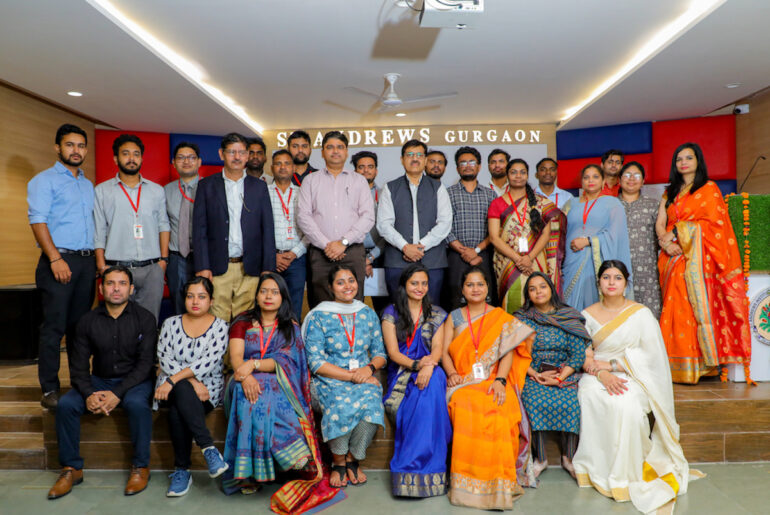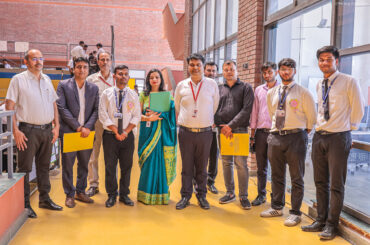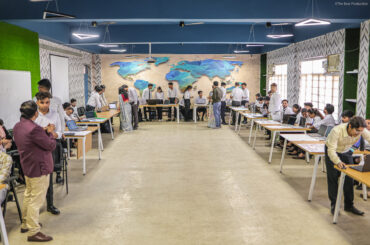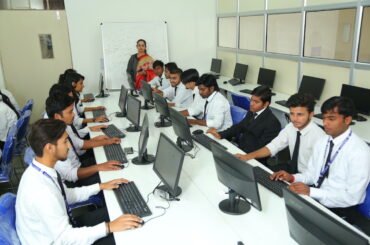BCA Course information
The Bachelor of Computer Applications (BCA) is an undergraduate degree program that provides comprehensive BCA course information, focusing on computer science and its applications.
Designed to provide a solid foundation in computer programming, software development, and information technology, the BCA curriculum typically includes subjects like data structures, database management systems, web technologies, software engineering, and networking.
The course duration is usually three years, divided into six semesters, and often involves practical lab sessions, project work, and internships to offer hands-on experience.
BCA graduates are well-equipped to pursue careers in software development, systems analysis, web design, and IT consulting, or to further their studies with advanced degrees in computer science or related fields.
Many institutions provide comprehensive BCA course information, emphasizing soft skills and professional development to ensure graduates are prepared for the dynamic demands of the tech industry.
Some of the most opted courses in India and St. Andrews college or different Engineering college or Management colleges are as follows:-
- Btech
- Btech CSE
- Btech ETCE
- MTech
- BCA
- BBA
- MBA
- MCA
- DPharma – St. Andrews College of Pharmacy
- BPharma – St. Andrews College of Pharmacy
- BArch – St. Andrews College of Architecture
BCA Course Objectives
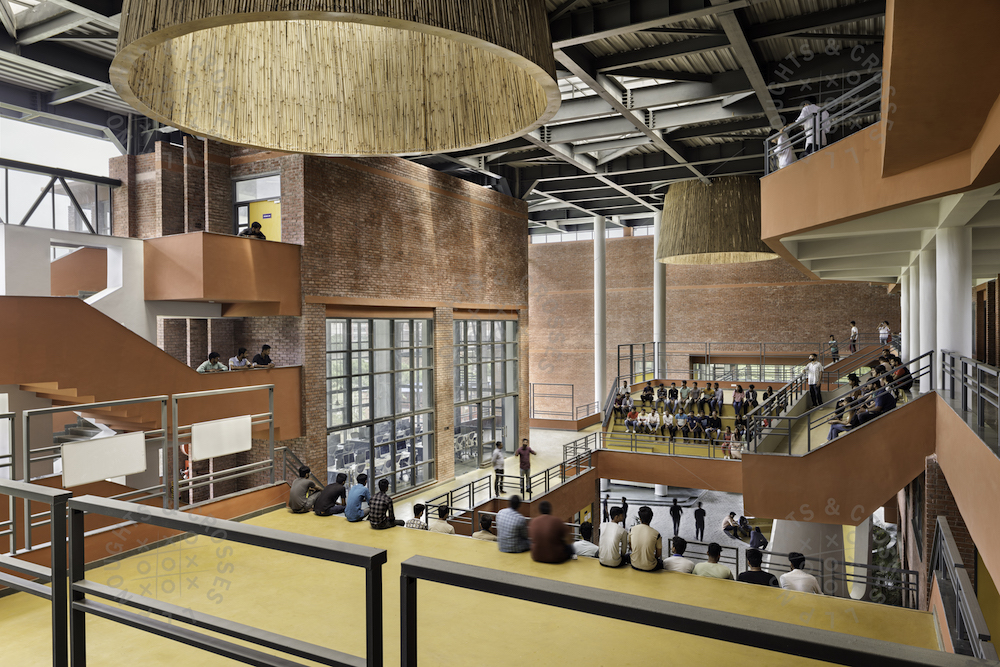
The Bachelor of Computer Applications (BCA) program provides comprehensive BCA course information, structured to equip students with thorough knowledge of computer applications and information technology.
Here are the key objectives of a BCA course:
Fundamental Knowledge:
- To provide a solid foundation in computer science principles, including programming languages, data structures, algorithms, and computer architecture.
Practical Skills:
- To develop practical skills in software development, including coding, debugging, testing, and software engineering practices.
- To equip students with the ability to use various software tools and technologies for application development.
Analytical Abilities:
- To enhance analytical and problem-solving skills through logical reasoning, mathematical foundations, and algorithmic thinking.
- To enable students to analyze and design complex computer systems and applications.
Technical Proficiency:
- To ensure proficiency in modern programming languages such as Java, C++, Python, and others.
- To familiarize students with database management systems, operating systems, and networking concepts.
Industry Relevance:
- To align the curriculum with current industry trends and requirements, ensuring that graduates are prepared for the job market.
- To provide exposure to emerging technologies such as artificial intelligence, machine learning, cloud computing, and cybersecurity.
Project Development:
- To encourage hands-on experience through projects, internships, and real-world applications.
- To develop teamwork and project management skills by working on group projects.
Ethical and Social Responsibility:
- To instill a sense of professional ethics and social responsibility in the field of information technology.
- To discuss the impact of technology on society and address issues related to privacy, security, and digital ethics.
Communication Skills:
- To improve oral and written communication skills necessary for effective collaboration and presentation in professional settings.
- To enhance the ability to document and present technical content clearly and concisely.
Career Preparedness:
- To prepare students for various career paths in IT, including software development, system administration, data analysis, and IT consultancy.
- To provide guidance for higher education opportunities and certifications in specialized areas of computer applications.
BCA Course Highlights
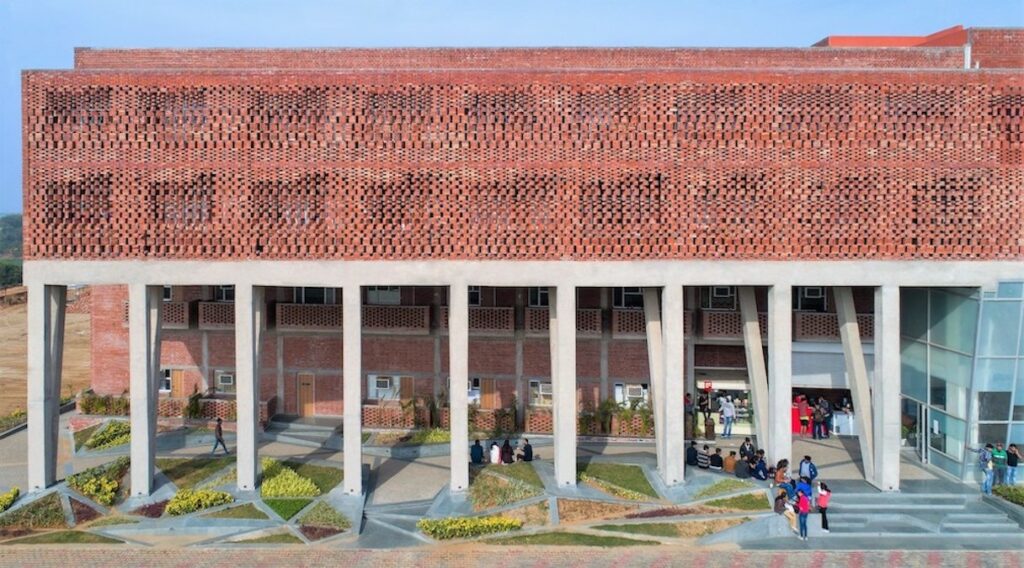
Here are the key highlights of a Bachelor of Computer Applications (BCA) course:
Course Overview
- Course Name: Bachelor of Computer Applications (BCA)
- Duration: 3 years (6 semesters)
- Level: Undergraduate
- Field: Computer Applications/Information Technology
- Mode: Full-time, Part-time, Distance Education
Eligibility Criteria
- Educational Qualification:
- Completion of 10+2 (Higher Secondary Education) from a recognized board
- Mathematics/Computer Science/Information Technology as one of the subjects (varies by institution)
- Minimum Percentage: Typically, a minimum of 50-60% in 10+2 (varies by institution)
- Entrance Exam: Some universities may conduct entrance exams; others may admit based on merit
Curriculum and Syllabus
- Core Subjects:
- Fundamentals of Computer Programming
- Database Management Systems
- Data Structures
- Operating Systems
- Software Engineering
- Web Technologies
- Object-Oriented Programming (C++, Java)
- Computer Networks
- Elective Subjects:
- Mobile Application Development
- Cloud Computing
- Cyber Security
- Artificial Intelligence
- Big Data Analytics
- Practical Components:
- Programming Labs
- Project Work
- Internships/Industry Training
Skills Developed
- Technical Skills:
- Programming Languages (C, C++, Java, Python, etc.)
- Software Development
- Database Management
- Web Development
- Soft Skills:
- Problem-Solving
- Analytical Thinking
- Communication Skills
- Teamwork
Career Opportunities
- Job Roles:
- Software Developer
- System Analyst
- Web Developer
- Database Administrator
- Network Administrator
- IT Support Analyst
- Cyber Security Analyst
- Industries:
- Information Technology
- Banking and Finance
- Healthcare
- Education
- Government Agencies
Higher Education and Certifications
- Postgraduate Courses:
- Master of Computer Applications (MCA)
- Master of Science (MSc) in IT/Computer Science
- MBA in IT Management
- Professional Certifications:
- Oracle Certified Professional (OCP)
- Microsoft Certified Solutions Expert (MCSE)
- Cisco Certified Network Associate (CCNA)
- Certified Information Systems Security Professional (CISSP)
Average Fees
- Public Colleges: ₹30,000 – ₹60,000 per year
- Private Colleges: ₹50,000 – ₹1,50,000 per year
Admission Process
- Application Form: Online/Offline submission through respective college/university portals
- Entrance Exam: College-specific entrance exams or common entrance tests like IPU CET, SET, etc.
- Counseling and Interview: Some institutes may have a personal interview or group discussion round.
BCA Course Eligibility Criteria

The eligibility criteria for a Bachelor of Computer Applications (BCA) program can vary slightly between institutions, but generally, the following BCA course information is commonly required:
- Educational Qualification:
- Completion of 10+2 (or equivalent) from a recognized board or university.
- Candidates should have studied Mathematics as one of the subjects in their 10+2 education. Some institutions also accept candidates from any stream (Science, Commerce, Arts) provided they have studied Mathematics.
- Minimum Marks:
- A minimum aggregate score of 50-60% in the 10+2 examination. This percentage may vary from one institution to another.
- Some colleges may have a relaxation in minimum marks for reserved category candidates (SC/ST/OBC).
- Age Limit:
- Generally, the age limit is between 17 to 25 years. However, this can vary by institution.
- Entrance Exam:
- Some institutions may require candidates to appear for an entrance exam conducted by the college or university.
- National or state-level entrance exams like IPU CET, SET, or others may also be considered for admission in some colleges.
- English Proficiency:
- Proficiency in English is often required, as the medium of instruction for the BCA course is usually English.
- Additional Requirements:
- Some institutions may conduct personal interviews or counseling sessions as part of the admission process.
- Candidates might be required to provide letters of recommendation, statement of purpose, or other documents as specified by the institution.
BCA Admission Process
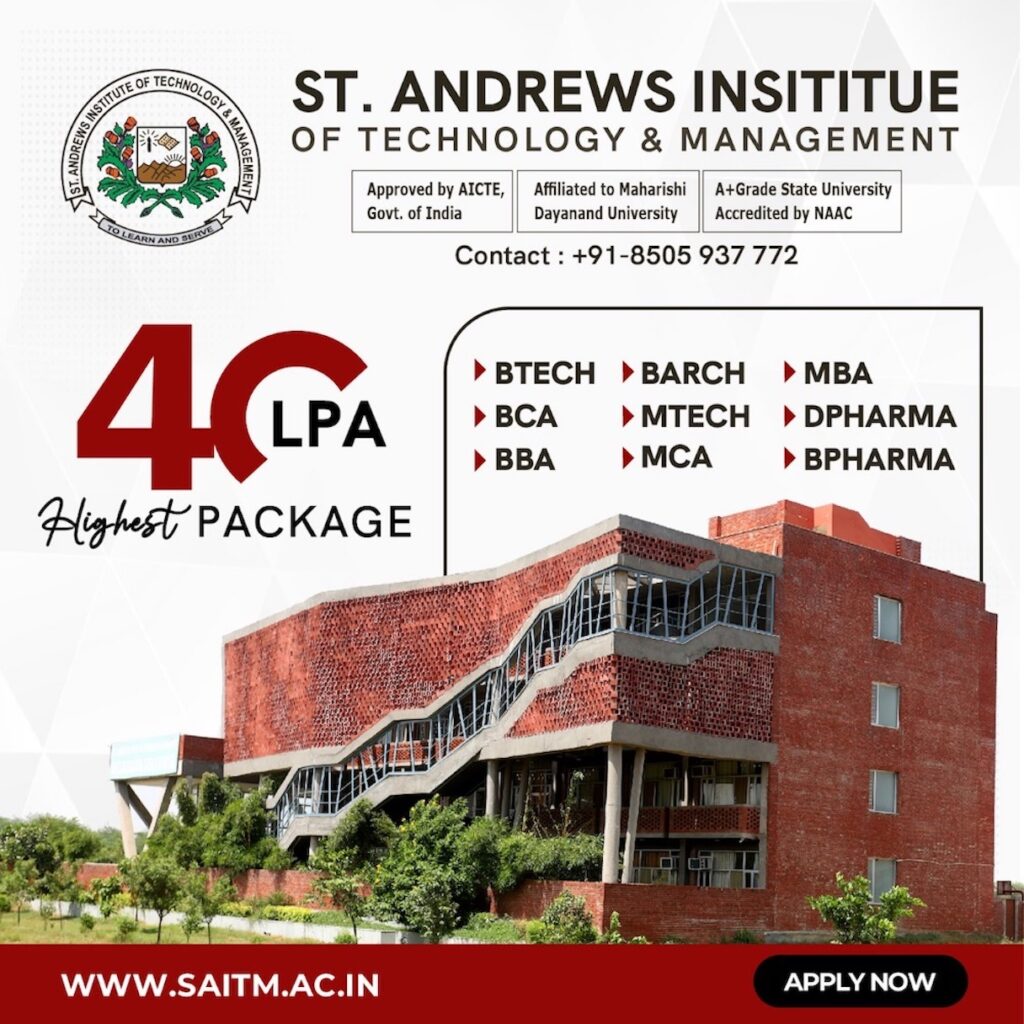
The admission process for a Bachelor of Computer Applications (BCA) program typically involves several steps, as outlined in the BCA course information.
While the exact process may vary slightly between institutions, the general steps are as follows:
Research and Selection of Colleges:
- Identify the colleges or universities offering the BCA program that align with your preferences, such as location, reputation, fee structure, and facilities.
Eligibility Check:
- Ensure that you meet the eligibility criteria for the BCA program at the selected institutions, including educational qualifications, minimum marks, and other requirements.
Application Form:
- Obtain and fill out the application form for the colleges or universities you are interested in. Application forms can usually be found on the institution’s official website.
- Complete the application form with accurate details and attach any required documents, such as mark sheets, certificates, and photographs.
Entrance Exam (if applicable):
- Some institutions require candidates to take an entrance exam. Prepare for and appear in the relevant entrance exams.
- Common BCA entrance exams include the IPU CET, and various other exams specific to different universities.
Submission of Application:
- Submit the completed application form along with the application fee to the institution within the specified deadline. This can usually be done online or through physical submission, depending on the institution’s process.
Admit Card (for Entrance Exam):
- If you are required to take an entrance exam, download the admit card from the institution’s website once it is released.
Entrance Exam Results:
- Check the results of the entrance exam on the institution’s website or as communicated by the institution.
Merit List:
- Institutions will release a merit list based on entrance exam scores or 10+2 marks, depending on their admission criteria.
- If your name appears on the merit list, you will be shortlisted for the next steps.
Counseling/Interview (if applicable):
- Some institutions may conduct counseling sessions or personal interviews for shortlisted candidates. Attend these sessions as scheduled.
Document Verification:
- Participate in the document verification process, where you will need to present original copies of your documents for verification.
Admission Offer:
- If you successfully clear all the steps, you will receive an admission offer from the institution. This may be in the form of an offer letter or a confirmation notice.
Fee Payment:
- Pay the admission fee or the first installment of the tuition fee to confirm your admission to the BCA programme.
Enrollment and Orientation:
- Complete the enrollment formalities and attend the orientation program as scheduled by the institution.
Commencement of Classes:
- Begin attending classes as per the academic calendar of the institution.
BCA Course Fees

According to BCA course information, the fees for a Bachelor of Computer Applications (BCA) program can vary significantly depending on the type of institution (public or private), its location, reputation, and other factors.
Here is a general overview of the fee structure for BCA programs in India:
Government/Public Institutions:
- Annual Fees: ₹10,000 to ₹50,000
- Total Course Fees: ₹30,000 to ₹1,50,000 for the entire duration (3 years)
Private Institutions:
- Annual Fees: ₹50,000 to ₹2,00,000
- Total Course Fees: ₹1,50,000 to ₹6,00,000 for the entire duration (3 years)
Deemed/Autonomous Universities:
- Annual Fees: ₹1,00,000 to ₹2,50,000
- Total Course Fees: ₹3,00,000 to ₹7,50,000 for the entire duration (3 years)
Factors Influencing Fees:
Reputation and Ranking: Higher-ranked and reputed institutions generally charge higher fees.
Location: Institutions in metropolitan cities and urban areas tend to have higher fees compared to those in smaller towns or rural areas.
Facilities and Infrastructure: Colleges offering advanced facilities, modern infrastructure, and additional resources may have higher fees.
Affiliations and Accreditations: Institutions affiliated with reputed universities or having recognized accreditations may charge higher fees.
Additional Costs:
Admission Fees: One-time fee paid at the time of admission.
Examination Fees: Paid per semester or annually for exams.
Library and Laboratory Fees: Charges for using library and lab facilities.
Hostel and Accommodation Fees: Applicable if opting for on-campus housing.
Other Miscellaneous Fees: Charges for extracurricular activities, sports, and other services.
Examples of BCA Fees at Specific Institutions:
- Delhi University (Public Institution)
- Annual Fees: ₹12,000 – ₹20,000
- St. Andrews Institute of Technology and Management (SAITM), Gurgaon
- Annual Fees: ₹78,500
- Indraprastha University, Delhi (Public/Private Institutions)
- Annual Fees: ₹50,000 – ₹1,50,000
BCA Courses and Syllabus
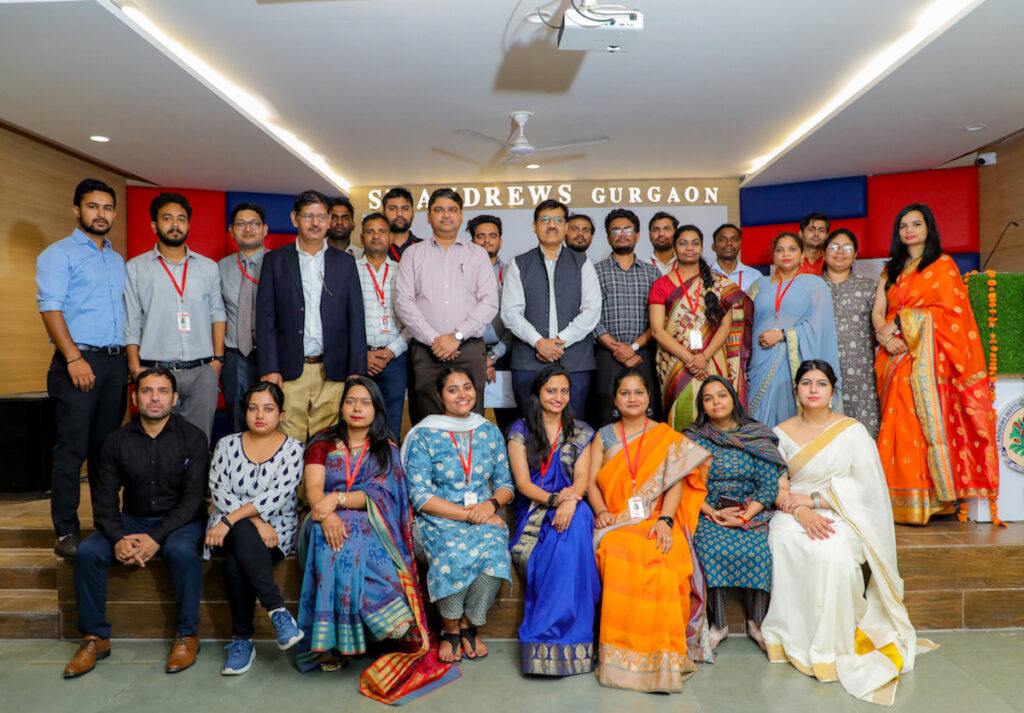
According to BCA course information, the Bachelor of Computer Applications (BCA) program usually lasts three years and is divided into six semesters. The curriculum is designed to provide a strong foundation in computer science, programming, and application development.
Here is an overview of the common courses and syllabus for a BCA program:
Year 1
Semester 1:
Fundamentals of Information Technology
- Introduction to computers, hardware, software, and operating systems.
- Basic concepts of data representation and storage.
Programming Principles and Algorithms
- Basics of programming and problem-solving techniques.
- Introduction to algorithms and flowcharts.
Mathematics I
- Mathematical concepts including sets, relations, functions, matrices, and calculus.
Business Communication
- Effective communication skills, business correspondence, and presentation techniques.
Computer Lab I (C Programming)
- Practical sessions on C programming language.
Semester 2:
Data Structures
- Concepts of data structures such as arrays, linked lists, stacks, queues, and trees.
- Algorithms for data manipulation.
Digital Electronics
- Basics of digital circuits, logic gates, combinational and sequential circuits.
Mathematics II
- Advanced topics in mathematics including probability, statistics, and discrete mathematics.
Database Management Systems
- Introduction to database concepts, SQL, and database design.
Computer Lab II (Data Structures and DBMS)
- Practical sessions on data structures and database management systems.
Year 2
Semester 3:
Object-Oriented Programming using C++
- Principles of object-oriented programming, classes, objects, inheritance, polymorphism.
Operating Systems
- Concepts of operating systems, process management, memory management, file systems.
Computer Networks
- Basics of networking, OSI model, TCP/IP, network devices, protocols.
Software Engineering
- Software development lifecycle, project management, software design and testing.
Computer Lab III (OOP using C++)
- Practical sessions on object-oriented programming in C++.
Semester 4:
Web Technology
- HTML, CSS, JavaScript, web development frameworks.
Java Programming
- Core Java concepts, applets, JavaBeans, exception handling.
Microprocessor and Assembly Language Programming
- Basics of microprocessors, assembly language programming, interfacing.
Organizational Behavior
- Understanding of organizational structure, behavior, culture, and management principles.
Computer Lab IV (Java Programming and Web Technology)
- Practical sessions on Java programming and web development.
Year 3
Semester 5:
Python Programming
- Introduction to Python, data types, control structures, functions, modules, and packages.
Computer Graphics
- Basics of computer graphics, graphic primitives, transformations, 3D modeling.
E-commerce
- Concepts of e-commerce, online business models, payment systems, security.
Elective I (e.g., Artificial Intelligence, Data Mining)
- Specialization topics based on interest.
Computer Lab V (Python Programming and Computer Graphics)
- Practical sessions on Python programming and computer graphics.
Semester 6:
Mobile Application Development
- Introduction to mobile app development, Android/iOS development, app deployment.
Information Security
- Basics of information security, cryptography, network security, cyber laws.
Project Work
- Development of a comprehensive project integrating concepts learned throughout the course.
Elective II (e.g., Cloud Computing, Internet of Things)
- Advanced topics for specialization.
Computer Lab VI (Mobile App Development)
- Practical sessions on mobile application development.
Additional Courses and Activities:
Soft Skills and Personality Development
Workshops and Seminars
Industrial Visits
Internships
BCA Specializations

The Bachelor of Computer Applications (BCA) program offers a range of specializations, and BCA course information enables students to concentrate on specific areas of interest within computer science and applications.
Here are some common specializations available in BCA programs:
1. Software Development
- Focuses on the principles and practices of software engineering, including software design, development, testing, and maintenance.
- Courses may include advanced programming, software project management, and software quality assurance.
2. Web Development
- Emphasizes the development of websites and web applications.
- Courses typically cover web technologies such as HTML, CSS, JavaScript, PHP, ASP.NET, and web frameworks.
3. Data Science and Analytics
- Concentrates on data analysis, statistical methods, and data visualization.
- Courses may include data mining, machine learning, big data technologies, and business analytics.
4. Information Security
- Focuses on protecting information systems from cyber threats and ensuring data security.
- Courses may cover cryptography, network security, ethical hacking, and cyber laws.
5. Mobile Application Development
- Specializes in creating applications for mobile devices, including smartphones and tablets.
- Courses may include Android development, iOS development, mobile UI/UX design, and mobile security.
6. Cloud Computing
- Focuses on the principles and practices of cloud computing, including cloud infrastructure, services, and deployment models.
- Courses may cover cloud architecture, virtualization, cloud security, and cloud service models (IaaS, PaaS, SaaS).
7. Internet of Things (IoT)
- Concentrates on the interconnected network of devices and systems.
- Courses may include IoT architecture, sensor technologies, IoT security, and IoT application development.
8. Artificial Intelligence and Machine Learning
- Emphasizes the development of intelligent systems and applications.
- Courses may include machine learning algorithms, neural networks, natural language processing, and robotics.
9. Game Development
- Focuses on designing and developing video games and interactive media.
- Courses may cover game design, game programming, computer graphics, and animation.
10. Multimedia and Animation
- Specializes in creating multimedia content and animations for various applications.
- Courses may include graphic design, 3D modeling, animation techniques, and multimedia authoring.
11. Network Administration
- Focuses on the management and administration of computer networks.
- Courses may cover network design, network protocols, network troubleshooting, and server administration.
12. E-commerce
- Emphasizes the principles and practices of electronic commerce and online business.
- Courses may include e-commerce technologies, online payment systems, digital marketing, and e-commerce security.
13. Database Management
- Specializes in the design, implementation, and management of database systems.
- Courses may cover database design, SQL, NoSQL databases, and database administration.
14. Business Intelligence
- Focuses on using data analysis and business intelligence tools to support decision-making processes.
- Courses may include data warehousing, business analytics, dashboard development, and reporting tools.
Career Scope and Job Opportunities after BCA Degree

A Bachelor of Computer Applications (BCA) degree opens up a wide range of career opportunities in the field of information technology and computer science.
Here are some of the potential career paths and job opportunities for BCA graduates:
Career Scope after BCA:
Software Development
- Role: Software Developer, Programmer, Application Developer
- Description: Design, develop, test, and maintain software applications and systems.
- Industries: IT services, software companies, startups, and tech firms.
Web Development
- Role: Web Developer, Front-End Developer, Back-End Developer, Full-Stack Developer
- Description: Develop and maintain websites and web applications.
- Industries: Digital agencies, IT services, e-commerce companies, and media firms.
Data Science and Analytics
- Role: Data Analyst, Data Scientist, Business Analyst
- Description: Analyze data to extract insights and support decision-making processes.
- Industries: Finance, healthcare, e-commerce, and consulting firms.
Information Security
- Role: Security Analyst, Cybersecurity Specialist, Ethical Hacker
- Description: Protect information systems from cyber threats and ensure data security.
- Industries: IT services, banking, government agencies, and defense organizations.
Mobile Application Development
- Role: Mobile App Developer, Android Developer, iOS Developer
- Description: Design and develop applications for mobile devices.
- Industries: IT services, startups, and software companies.
Network Administration
- Role: Network Administrator, Network Engineer, Systems Administrator
- Description: Manage and maintain computer networks and systems.
- Industries: IT services, telecommunications, and large enterprises.
Cloud Computing
- Role: Cloud Engineer, Cloud Solutions Architect, DevOps Engineer
- Description: Design and manage cloud-based infrastructure and services.
- Industries: IT services, software companies, and large enterprises.
Artificial Intelligence and Machine Learning
- Role: AI Engineer, Machine Learning Engineer, Data Scientist
- Description: Develop intelligent systems and machine learning models.
- Industries: IT services, healthcare, finance, and technology firms.
Game Development
- Role: Game Developer, Game Designer, Animator
- Description: Design and develop video games and interactive media.
- Industries: Gaming companies, media firms, and entertainment industry.
Database Management
- Role: Database Administrator, Database Developer, SQL Developer
- Description: Design, implement, and manage database systems.
- Industries: IT services, finance, healthcare, and large enterprises.
Job Opportunities after BCA:
IT Companies:
- Roles: Software Developer, System Analyst, Network Administrator, Database Administrator
- Companies: TCS, Infosys, Wipro, HCL, Accenture
E-commerce Companies:
- Roles: Web Developer, Data Analyst, Security Analyst
- Companies: Amazon, Flipkart, Snapdeal
Banking and Financial Services:
- Roles: IT Support, Data Analyst, Security Specialist
- Companies: HDFC, ICICI, SBI, JP Morgan
Telecommunication:
- Roles: Network Engineer, Systems Administrator
- Companies: Airtel, Vodafone, Jio
Consulting Firms:
- Roles: Business Analyst, IT Consultant
- Companies: Deloitte, PwC, KPMG, EY
Startups:
- Roles: Various IT roles based on the startup’s focus (e.g., app development, web development)
- Industries: Diverse sectors including technology, healthcare, finance, and education.
Higher Education and Certifications:
- MBA in Information Technology: For managerial roles in IT companies.
- MCA (Master of Computer Applications): For advanced knowledge and specialization in computer applications.
- Certifications: CCNA, AWS, Google Cloud, Microsoft Azure, Data Science certifications, Ethical Hacking certifications.
Salary and Scope after BCA
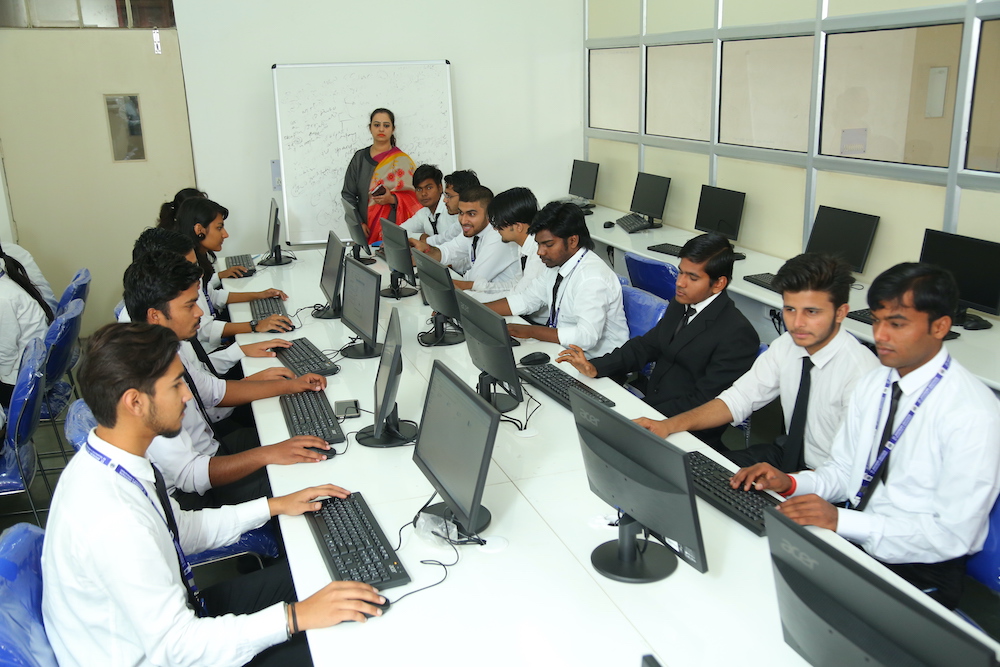
The salary and career scope after obtaining a Bachelor of Computer Applications (BCA) degree can vary based on factors such as location, industry, experience, and the individual’s skill set. Here’s a detailed overview:
Salary After BCA:
Entry-Level Positions:
- Software Developer/Programmer: ₹3,00,000 – ₹5,00,000 per annum
- Web Developer: ₹2,50,000 – ₹4,50,000 per annum
- Data Analyst: ₹3,00,000 – ₹5,00,000 per annum
- Network Administrator: ₹2,50,000 – ₹4,50,000 per annum
- IT Support Technician: ₹2,00,000 – ₹4,00,000 per annum
Mid-Level Positions (2-5 years of experience):
- Software Engineer: ₹5,00,000 – ₹8,00,000 per annum
- Senior Web Developer: ₹5,00,000 – ₹8,00,000 per annum
- Data Scientist: ₹6,00,000 – ₹10,00,000 per annum
- System Administrator: ₹4,00,000 – ₹7,00,000 per annum
- Security Analyst: ₹5,00,000 – ₹9,00,000 per annum
Senior-Level Positions (5+ years of experience):
- Project Manager: ₹8,00,000 – ₹12,00,000 per annum
- Senior Software Developer: ₹8,00,000 – ₹15,00,000 per annum
- Database Administrator: ₹7,00,000 – ₹12,00,000 per annum
- IT Consultant: ₹10,00,000 – ₹20,00,000 per annum
- Network Architect: ₹9,00,000 – ₹15,00,000 per annum
Factors Influencing Salary:
Location:
- Salaries tend to be higher in metropolitan cities such as Bangalore, Mumbai, Delhi, Pune, and Hyderabad due to the higher cost of living and the concentration of IT companies.
Industry:
- IT services, finance, healthcare, and e-commerce often offer higher salaries compared to other sectors.
Company:
- Reputed companies like TCS, Infosys, Wipro, Accenture, and multinational corporations typically offer competitive salaries and benefits.
Skills and Certifications:
- Additional certifications in areas such as cloud computing, data science, cybersecurity, and advanced programming can significantly enhance salary prospects.
Scope After BCA:
Career Growth:
- BCA graduates have ample opportunities for career growth. With experience and additional qualifications, they can move into senior technical roles or managerial positions.
Higher Education:
- Pursuing higher studies such as MCA (Master of Computer Applications), MBA (Master of Business Administration), or specialized certifications can lead to better job prospects and higher salaries.
Diverse Roles:
- BCA graduates can explore various roles such as software development, web development, data analysis, network administration, cybersecurity, cloud computing, and more.
Freelancing and Entrepreneurship:
- The skills acquired during a BCA program enable graduates to work as freelancers or start their own tech ventures, offering services like software development, web design, and IT consulting.
Industry Demand:
- The demand for IT professionals is consistently high across various industries, ensuring a stable job market for BCA graduates.
How to Choose a Top BCA College?

Choosing a top BCA college is a critical decision that can significantly impact your education and career prospects.
Here are some key factors to consider when selecting a BCA college:
1. Accreditation and Affiliation:
- Accreditation: Ensure the college is accredited by recognized bodies such as the National Board of Accreditation (NBA) or the National Assessment and Accreditation Council (NAAC).
- Affiliation: Check if the college is affiliated with a reputable university, which ensures that the curriculum is standardized and recognized.
2. Reputation and Ranking:
- Rankings: Look at national and regional rankings published by reputable sources like NIRF (National Institutional Ranking Framework), India Today, or QS World University Rankings.
- Reputation: Consider the college’s reputation in the field of computer applications and IT. This can be gauged through alumni feedback, industry connections, and historical performance.
3. Curriculum and Specializations:
- Curriculum: Evaluate the comprehensiveness and relevance of the curriculum. A good BCA program should cover a wide range of topics including programming, data structures, algorithms, database management, web development, and software engineering.
- Specializations: Check if the college offers specializations or electives that align with your career interests, such as data science, cybersecurity, artificial intelligence, or mobile app development.
4. Faculty:
- Qualifications: Research the qualifications and experience of the faculty members. Professors with industry experience and advanced degrees can provide valuable insights and guidance.
- Student-Faculty Ratio: A lower student-faculty ratio can lead to more personalized attention and better learning experiences.
5. Infrastructure and Facilities:
- Labs and Equipment: Ensure the college has well-equipped computer labs with the latest hardware and software.
- Libraries: A good library with a wide range of books, journals, and online resources is essential for research and learning.
- Campus Facilities: Check for additional facilities like Wi-Fi, hostels, sports complexes, and recreational areas.
6. Placement Records:
- Placement Rate: Investigate the college’s placement record, including the percentage of students placed and the types of companies that recruit from the campus.
- Industry Connections: Strong ties with the industry can lead to better internship opportunities, projects, and job placements.
7. Internship and Project Opportunities:
- Internships: Look for colleges that provide or facilitate internships, which are crucial for gaining practical experience.
- Projects: Check if the curriculum includes industry-relevant projects, which can enhance your problem-solving skills and employability.
8. Alumni Network:
- Alumni Success: A strong alumni network can provide mentorship, networking opportunities, and insights into various career paths.
- Engagement: Check how actively the alumni engage with the college, such as through guest lectures, seminars, or placement assistance.
9. Fees and Scholarships:
- Tuition Fees: Compare the fee structures of different colleges and assess if they fit within your budget.
- Scholarships: Look for colleges that offer scholarships or financial aid to meritorious or needy students.
10. Location:
- Proximity to Tech Hubs: Colleges located near major IT hubs like Bangalore, Pune, Hyderabad, or Delhi may offer better industry exposure and job opportunities.
- Accessibility: Consider the accessibility and safety of the college’s location.
11. Reviews and Feedback:
- Student Reviews: Read reviews and testimonials from current students and alumni to get an honest perspective on the college’s environment, teaching quality, and support services.
- Campus Visits: If possible, visit the campus to get a firsthand experience of the facilities and interact with students and faculty.
12. Extracurricular Activities:
- Clubs and Societies: Participation in clubs and societies can enhance your soft skills and provide a well-rounded education.
- Events and Competitions: Check if the college organizes or participates in tech fests, coding competitions, hackathons, and other events that can enrich your learning experience.
Top Companies Hiring BCA Graduates

BCA graduates are in high demand across various industries due to their knowledge and skills in computer applications and information technology.
Here are some of the top companies that commonly hire BCA graduates:
IT Services and Consulting Companies:
- Tata Consultancy Services (TCS)
- Infosys
- Wipro
- HCL Technologies
- Tech Mahindra
- Cognizant
- Capgemini
- Accenture
- IBM
- Deloitte
Software and Technology Companies:
- Microsoft
- Adobe
- Oracle
- SAP
- Intuit
- Salesforce
- VMware
- Cisco Systems
- Red Hat
E-commerce and Internet Companies:
- Amazon
- Flipkart
- Paytm
- Zomato
- Swiggy
- Ola
- Uber
- MakeMyTrip
- Byju’s
- Snapdeal
Banking and Financial Services:
- ICICI Bank
- HDFC Bank
- Axis Bank
- State Bank of India (SBI)
- JP Morgan Chase
- Goldman Sachs
- American Express
- Barclays
- Standard Chartered Bank
- Citibank
Telecommunication Companies:
- Bharti Airtel
- Reliance Jio
- Vodafone Idea
- Tata Communications
- BSNL
Healthcare and Pharmaceutical Companies:
- Apollo Hospitals
- Fortis Healthcare
- Cipla
- Sun Pharmaceutical
- Dr. Reddy’s Laboratories
Benefits of Pursuing BCA

Pursuing a Bachelor of Computer Applications (BCA) offers numerous benefits for students interested in the field of computer science and information technology. Here are some key advantages:
1. Strong Foundation in IT and Computer Applications:
- Comprehensive Curriculum: The BCA program provides a robust foundation in programming languages, database management, software development, networking, and other essential IT skills.
- Practical Knowledge: Emphasis on hands-on learning through labs, projects, and internships ensures practical understanding and application of theoretical concepts.
2. Diverse Career Opportunities:
- Wide Range of Job Roles: Graduates can pursue various career paths, including software development, web development, data analysis, network administration, and more.
- Growing Industry Demand: The IT industry is expanding rapidly, creating a high demand for skilled professionals with a background in computer applications.
3. Competitive Salaries:
- Attractive Compensation: BCA graduates often receive competitive starting salaries. According to BCA course information, these salaries can increase significantly with experience and additional qualifications.
4. Further Education and Specialization:
- Advanced Studies: Graduates can pursue higher education options such as Master of Computer Applications (MCA), MBA in Information Technology, or specialized certifications in areas like cybersecurity, data science, or cloud computing.
- Specializations: The BCA program offers opportunities to specialize in specific areas of interest, enhancing expertise and career prospects.
5. Development of Essential Skills:
- Technical Skills: Proficiency in programming, software development, database management, and networking.
- Soft Skills: Improved communication, teamwork, problem-solving, and project management skills through group projects and presentations.
- Analytical Thinking: Enhanced ability to analyze and solve complex problems logically and efficiently.
6. Flexibility and Versatility:
- Freelancing Opportunities: Skills acquired during the BCA program enable graduates to work as freelancers or consultants, offering services in software development, web design, and IT support.
- Entrepreneurship: Graduates can start their own tech ventures or develop innovative software products and solutions.
7. Global Opportunities:
- International Careers: The skills and knowledge gained in a BCA program are globally recognized. According to BCA course information, this provides opportunities to work with multinational companies and explore careers abroad.
- Remote Work: The IT industry offers flexibility, including remote work options, allowing graduates to work for companies worldwide from any location.
8. Industry-Relevant Curriculum:
- Updated Content: The BCA curriculum is often updated to align with industry trends and technological advancements, ensuring that graduates are well-prepared for the job market.
- Internships and Projects: Many programs include mandatory internships and real-world projects, providing practical experience and enhancing employability.
9. Scholarships and Financial Aid:
- Financial Support: Many institutions offer scholarships, grants, and financial aid to meritorious and needy students, making education more accessible.
10. Networking Opportunities:
- Alumni Network: Access to a strong alumni network that can provide mentorship, career guidance, and job referrals.
- Industry Connections: Opportunities to connect with industry professionals through seminars, workshops, and campus placements.
11. Personal Growth and Development:
- Holistic Development: In addition to technical skills, BCA programs often focus on overall personal development, including leadership qualities, ethical practices, and social responsibility.
- Extracurricular Activities: Participation in clubs, societies, and events helps in building a well-rounded personality and developing interpersonal skills.
12. Foundation for Emerging Technologies:
- Adaptability: A BCA degree provides a solid foundation in core IT concepts, making it easier to learn and adapt to emerging technologies like artificial intelligence, machine learning, blockchain, and IoT.
Required Skills for BCA
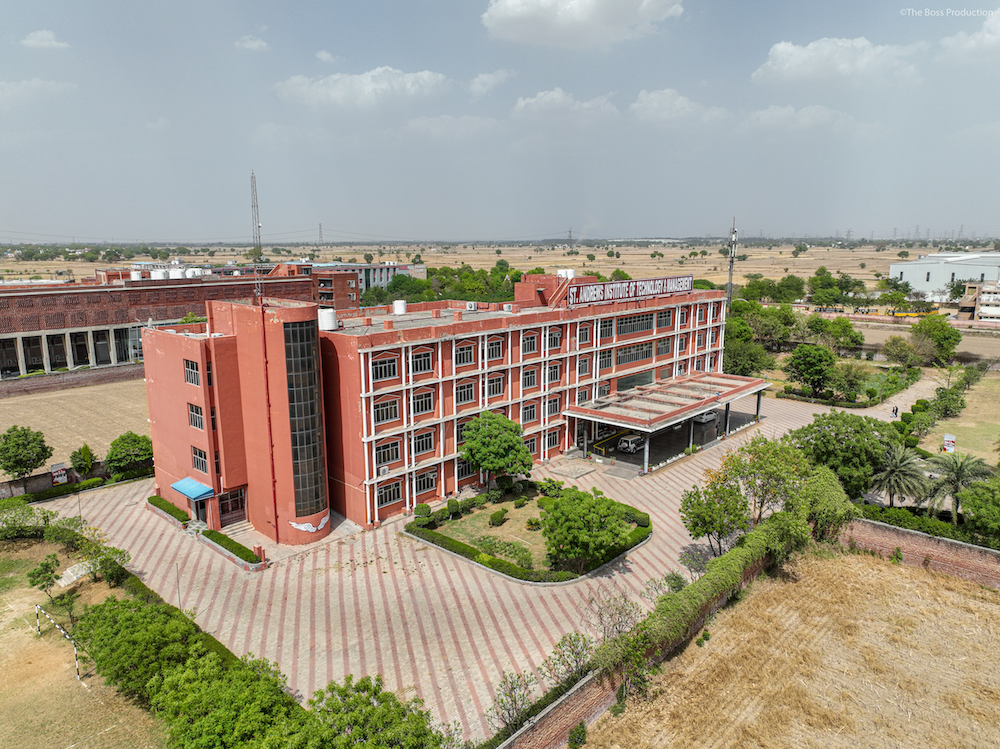
To excel in a Bachelor of Computer Applications (BCA) program and pursue a successful career in the field of computer applications and information technology, certain skills are essential. According to BCA course information, these skills include programming proficiency, analytical thinking, problem-solving abilities, and a strong understanding of software development and database management.
Here is a list of key skills required for BCA students:
1. Technical Skills:
Programming Languages:
- Proficiency in programming languages such as C, C++, Java, Python, and JavaScript.
- Understanding of syntax, semantics, and common programming paradigms.
Web Development:
- Knowledge of HTML, CSS, JavaScript, and frameworks like Angular, React, or Vue.js.
- Ability to develop and maintain websites and web applications.
Database Management:
- Understanding of database concepts, SQL, and database management systems like MySQL, Oracle, and MongoDB.
- Skills in designing and managing databases.
Software Development:
- Familiarity with software development life cycle (SDLC), software engineering principles, and methodologies like Agile and Scrum.
- Skills in developing, testing, and deploying software applications.
Networking:
- Basic knowledge of computer networks, protocols, and network security.
- Understanding of network configuration and troubleshooting.
Operating Systems:
- Knowledge of operating systems such as Windows, Linux, and Unix.
- Skills in system administration and management.
2. Analytical and Problem-Solving Skills:
Logical Thinking:
- Ability to think logically and systematically to solve complex problems.
- Skills in creating algorithms and flowcharts to represent solutions.
Analytical Skills:
- Ability to analyze data, identify patterns, and draw meaningful conclusions.
- Skills in data analysis and interpretation.
3. Communication Skills:
Verbal Communication:
- Effective oral communication skills for presenting ideas and collaborating with team members.
- Ability to explain technical concepts to non-technical stakeholders.
Written Communication:
- Proficiency in writing technical documentation, reports, and code comments.
- Skills in creating clear and concise documentation.
4. Project Management and Teamwork:
Team Collaboration:
- Ability to work effectively in a team environment, contributing to group projects and tasks.
- Skills in conflict resolution and teamwork.
Project Management:
- Basic understanding of project management principles and tools.
- Skills in planning, organizing, and managing projects to meet deadlines.
5. Self-Learning and Adaptability:
Continuous Learning:
- Willingness to learn new technologies, tools, and programming languages.
- Ability to keep up with industry trends and advancements.
Adaptability:
- Flexibility to adapt to changing technologies and work environments.
- Skills in quickly learning and applying new skills.
6. Attention to Detail:
- Precision: Ability to write clean, error-free code and identify bugs or issues in existing code.
- Thoroughness: Skills in thoroughly testing and debugging software applications.
7. Creativity and Innovation:
- Creative Thinking: Ability to come up with innovative solutions and approaches to problems.
- Innovation: Skills in designing user-friendly and efficient software applications.
8. Mathematical and Statistical Skills:
- Mathematics: Strong foundation in mathematics, including discrete mathematics, algebra, and calculus.
- Statistics: Basic understanding of statistical concepts for data analysis and algorithm development.
9. Ethical and Professional Conduct:
- Ethics: Understanding of ethical principles in computing, including data privacy, security, and intellectual property.
- Professionalism: Skills in maintaining professionalism and ethical conduct in the workplace.
10. Specialized Skills (Optional):
- Mobile App Development: Skills in developing mobile applications for Android and iOS platforms.
- Artificial Intelligence and Machine Learning: Understanding of AI and ML concepts, algorithms, and tools.
- Cloud Computing: Knowledge of cloud platforms such as AWS, Azure, and Google Cloud.
FAQs
What is the qualification for BCA?
To pursue BCA, the minimum eligibility requirement is achieving 50% in a 10+2 or equivalent examination. According to BCA course information, candidates should have computer application, computer science, or mathematics as an extra or core subject.
Is BCA a good course?
Indeed, it is a good course who wishes to pursue a career in the IT sector.
Which entrance exam is needed for BCA?
Some of the best entry entrance tests for BCA admissions are SET, IPU CET, UPSEE, and BVET.
How hard is BCA?
The difficulty of a Bachelor of Computer Application (BCA) program depends on the individual’s aptitude and interest in computer science. According to BCA course information, the curriculum typically includes learning programming languages, software development, database management, and networking. With consistent study, practical exercises, and strong problem-solving skills, many students find the program manageable and ultimately rewarding.
Is there a good career after BCA?
Yes, a BCA graduate can enjoy a successful career in IT and software development. According to BCA course information, typical roles for BCA graduates include software developer, systems analyst, or network administrator. Pursuing advanced studies or obtaining certifications can further enhance job prospects in specialized fields like cybersecurity, data science, and artificial intelligence.
What are subjects in BCA?
The core subjects in a BCA program typically include:
- Programming Languages (C, C++, Java, Python)
- Database Management Systems
- Web Development (HTML, CSS, JavaScript)
- Software Engineering
- Computer Networks
- Data Structures
- Operating Systems
- Mathematics for Computing
- Object-Oriented Programming
- Computer Architecture
- Artificial Intelligence
- Cybersecurity Basics
- Project Management
- Mobile App Development
What is the scope of BCA course?
The scope of a BCA course is broad and promising. According to BCA course information, graduates can pursue careers in various IT and computer-related fields, including:
- Software Development: Creating and maintaining software applications.
- Web Development: Designing and developing websites and web applications.
- System Administration: Managing and maintaining IT infrastructure.
- Database Administration: Overseeing database systems and ensuring their performance.
- Network Administration: Managing and securing network systems.
- Cybersecurity: Protecting systems and data from cyber threats.
- Data Science: Analyzing and interpreting complex data to aid decision-making.
- Mobile App Development: Developing applications for mobile devices.
- IT Support: Providing technical support and troubleshooting.
- Higher Studies: Pursuing advanced degrees like MCA, MBA, or specialized certifications.
What is the use BCA course?
A BCA (Bachelor of Computer Applications) course is useful for several reasons:
- Foundation in IT: Provides a strong foundation in computer science and applications.
- Skill Development: Develops practical skills in programming, software development, and web technologies.
- Career Opportunities: Opens up various career opportunities in IT and related fields.
- Higher Education: Serves as a stepping stone for advanced studies like MCA, MBA, or other specialized certifications.
- Industry Demand: Meets the growing demand for IT professionals in various industries.
- Problem-Solving: Enhances analytical and problem-solving abilities through practical projects and coursework.
- Versatility: Equips students with versatile skills applicable in multiple domains such as cybersecurity, data science, and network administration.
What is the BCA course salary?
The salary for BCA graduates varies based on factors like experience, job role, and location. On average:
- Entry-Level: ₹2.5 to ₹4.5 lakhs per annum
- Mid-Level: ₹4.5 to ₹8 lakhs per annum
- Experienced Professionals: ₹8 to ₹15 lakhs per annum or more
What is the eligibility for BCA?
The eligibility criteria for a BCA (Bachelor of Computer Applications) course generally include:
- Educational Qualification: Completion of 10+2 (or equivalent) from a recognized board.
- Minimum Marks: A minimum aggregate score of 45-50% in 10+2, though this can vary by institution.
- Mathematics/Computer Science: Some colleges may require Mathematics or Computer Science as a subject in 10+2.
- Entrance Exams: Certain institutions may have entrance exams or interviews as part of their admission process.
Can I do BCA without maths?
Yes, you can enroll in a BCA program even if you haven’t studied Mathematics in 10+2, as not all top BCA colleges require it. However, according to BCA course information, some colleges and universities do consider Mathematics as a prerequisite. It’s essential to check the specific eligibility criteria of the top BCA colleges you are interested in to ensure you meet their requirements.
Can we do BCA after 12th?
Yes, you can pursue a BCA (Bachelor of Computer Applications) after completing your 12th grade. According to BCA course information, the general eligibility criteria include having completed 10+2 from a recognized board, often with a minimum aggregate score. Some institutions may also have additional requirements, such as having studied Mathematics or Computer Science in 12th grade or passing an entrance exam.
What is the qualification for BCA stream?
The qualifications for pursuing a BCA (Bachelor of Computer Applications) stream typically include:
- Educational Qualification: Completion of 10+2 (or equivalent) from a recognized board.
- Minimum Marks: A minimum aggregate score of 45-50% in 10+2, though this can vary by institution.
- Subject Requirements: Some colleges may require Mathematics or Computer Science as a subject in 10+2, but many institutions accept students from any stream.
- Entrance Exams: Certain colleges and universities may conduct entrance exams or interviews as part of their admission process.

